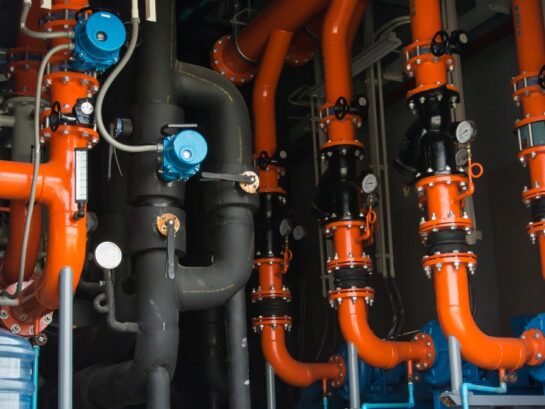Once Precision Fabricating & Cleaning (PFC) has precision cleaned your system, it’s time for us to install or reinstall the piping, components, and subsystems. To reduce the risk of the system becoming contaminated during field installation, we established certain contamination control requirements.
You may be wondering why it’s so important to follow contamination control requirements for field installation. Below, we explain how crucial it is, not just to the success of the system but for the safety of the people working on or near it. We’ll also guide you through a simplified version of our requirements so you can visualize what our field installation process looks like.
What Are Contamination Control Requirements?
Contamination control requirements are rules that we established at PFC to protect systems from becoming contaminated during the installation of new or old parts. In this scenario, the system has recently been precision cleaned.
Precision cleaning is a multi-step cleaning process that aims to remove all forms of contamination from the system, including moisture, scale, rust, dirt, grease, and more. It even works to remove contaminants that are no bigger than a micron, a unit of measurement that is too small for the human eye to see.
Why Are They Established For Field Installation?
Given the rigorous nature of precision cleaning, it’s easy to see why industrial cleaning and testing companies like PFC want to protect the parts and systems they just cleaned from becoming contaminated again.
But there’s an even more critical reason these parts and systems must remain free of contamination. If the media that runs through the system gets contaminated, it could cause serious damage when it reaches its destination.
Consider fuel systems, for example, which transport fuel into vehicles. When the fuel becomes contaminated, it often damages the vehicle’s engine. The engine may stop working, or, in extreme cases, it may even explode, causing terrible injuries in nearby workers and possibly ruining the other equipment on the work site.
How are we able to keep our field installation areas, tools, materials, and other components free of contamination? We do it by establishing contamination control requirements.
What Are PFC’s Requirements For Field Installation Of Precision Cleaned Piping, Components, And Subsystems?
Before field installation of precision-cleaned piping, components, and subsystems can take place, PFC performs a pre-operation quality check. Our goal is to verify that every system, surface, tool, material, and operating area meets our requirements for contamination control.
Below is a list of PFC’s minimum field contamination control requirements.
1. Critical Surfaces
Critical surfaces are surfaces that, if they were to become contaminated, could compromise the operation of the entire system. They are also susceptible to damage during processing. When we process parts with critical surfaces, our mandate is to treat them with an increased level of care and awareness.
2. Tooling
All connecting component and tool surfaces must be visually clean of contamination such as dirt, scale, rust, and grease before they can be used.
3. System Restoration Tools Requirements
To restore a system that has been precision cleaned, PFC requires certain tools be kept on hand. These include standard hand tools, calibrated torque wrenches, and face shields, as well as scaffolding and safety harnesses as they are required.
4. System Restoration Reference Documents
The team performing the system restoration must keep certain reference documents on hand. These documents include the component installation instructions, cut sheets, and/or drawings, as well as the manufacturer’s torque requirements.
5. Materials Requirements
The team members who undertake the system restoration must wear and keep certain materials on their person. For example, they must wear non-powdered cleanroom gloves, have access to lint-free wipes, and use pressure sensitive tape that adheres to an exacting industry standard. There is a much longer list of required materials, all of which are designed to reduce contamination to the system.
6. Area Cleanup
The area where the installation will be performed must undergo stringent housecleaning. This includes the removal of all loose or extraneous equipment.
7. Installation Area
If the installation area is open to adverse weather conditions (such as wind, moisture, and dirt), a controlled environmental enclosure such as a tent must be fabricated around the component area of the system. A plastic floor must also be set up. These protective measures will prevent the system from becoming contaminated via weather.
8. Assembly Preparations
In this second to last step to ensure the field installation area adheres to PFC’s contamination control requirements, we must verify that each of the previous steps were followed to the letter.
For example, we must ensure that the component installation instructions, cut sheets, and drawings are available for use during the installation process. We must also wash and clean all areas in the immediate vicinity of the installation operation with solvent.
9. GN2 Blanket Purge
In some cases, we may perform a GN2 blanket purge as a final step. GN2 stands for “gaseous nitrogen.” This step ensures that the atmosphere within the installation area is free of contaminants.
PFC’s Controlled Climate Requirements Result In A Safe And Effective Field Installation
Installing or reinstalling piping, components, and subsystems back into a system which has been precision cleaned should not be taken lightly. At PFC, we adhere to exacting standards to make sure that the cleanliness of the installation meets the specifications required by the company who owns the system.
By hiring a cleaning and testing company like PFC to install or reinstall your system under strict controlled climate requirements, you guarantee safe and effective field installation. You also increase the likelihood that your system will function better and longer.
Contact us today!

